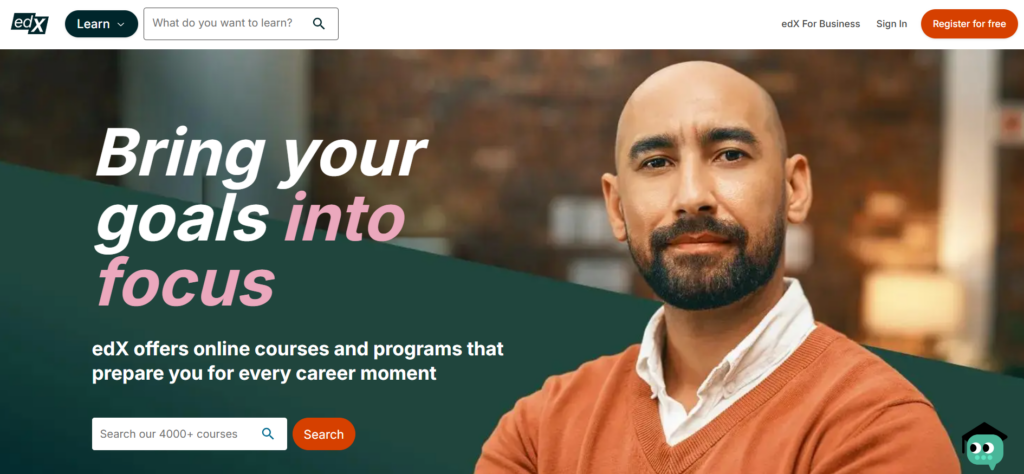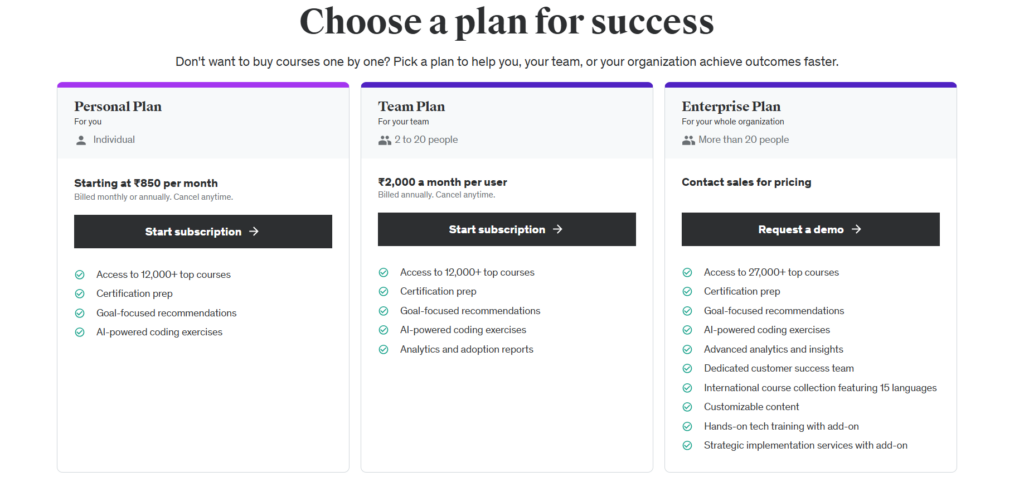Choosing between Udemy and edX can feel tricky, especially when you’re eager to learn something new but want the best platform for your goals.
I’ve been there, scrolling through endless course options, wondering which platform offers better value, quality, and flexibility.
Udemy is a favorite for its practical, skill-focused courses that you can complete at your own pace. Meanwhile, edX stands out with its academic vibe, offering courses from top universities like Harvard and MIT, often with a chance to earn verified certificates.
So, which is better? It depends on what you’re looking for—quick, hands-on learning or a more structured, in-depth experience. In this article, I’ll break down the pros and cons of each platform to help you pick the right one for your learning journey.
Udemy
Udemy is a global online learning platform offering courses across diverse fields like technology, business, design, and personal development.

It connects learners with expert instructors through an extensive library of on-demand video courses. Designed for flexibility, Udemy allows users to learn at their own pace, anytime, and anywhere.
Its offerings range from beginner to advanced levels, catering to professionals seeking career advancement, students supplementing their education, or individuals pursuing hobbies. Instructors can monetize their expertise by creating and selling courses.
With affordable pricing, frequent discounts, and a community-driven approach, Udemy democratizes education and empowers individuals worldwide to acquire new skills.
EDX
edX is an online learning platform founded by Harvard and MIT in 2012. It offers high-quality courses, programs, and degrees from top universities and institutions worldwide.

Focused on making education accessible, edX provides subjects ranging from computer science to business, engineering, and humanities. Learners can choose free courses (audit mode) or opt for certificates and degree programs for a fee.
Through interactive content, videos, quizzes, and peer discussions, edX delivers flexible, self-paced learning.
Its open-source platform, Open edX, enables organizations to host their own courses. edX empowers millions globally to learn new skills and advance their careers.
Features Comparisn: Udemy vs Edx
Here’s a detailed comparison of Udemy and edX, highlighting their features and explaining why Udemy might be considered better depending on specific user needs.
| Features | Udemy | edX |
|---|---|---|
| Platform Type | Online course marketplace | MOOC (Massive Open Online Course) |
| Course Variety | Extensive variety: professional, hobbyist, business, and lifestyle topics | Focus on academic, professional, and technical courses |
| Target Audience | General public: anyone looking for skills or hobbies | Students, professionals, and academics |
| Course Providers | Individual instructors, freelancers, and small businesses | Universities (Harvard, MIT, etc.) and industry leaders (IBM, Microsoft) |
| Course Pricing | Affordable, pay-per-course with frequent discounts | Mix of free courses, paid certificates, and costly professional programs |
| Certificate Options | Certificate of Completion (not accredited) | Verified certificates and degrees (accredited) |
| Flexibility | Self-paced learning, no deadlines | Self-paced and instructor-led courses with deadlines |
| Learning Resources | Videos, quizzes, downloadable resources | Videos, quizzes, forums, exams, and reading materials |
| Mobile App | Excellent mobile app with offline access | Mobile app with limited offline access |
| Languages Supported | Multi-language courses | Primarily English, with limited multilingual options |
| Skill Development Focus | Focuses on practical, job-ready skills | Academic knowledge and professional certifications |
| Refund Policy | 30-day money-back guarantee | Varies by course and provider |
| Course Duration | Flexible: short courses (1-10 hours) | Longer academic courses (weeks to months) |
| Community Interaction | Limited, primarily Q&A forums | Stronger interaction via forums and group discussions |
| Specialization | Technical skills, hobbies, soft skills | Degrees, advanced certifications, professional development |
Summary
Udemy is better suited for learners who want affordable, flexible, and practical courses in a wide variety of topics. It’s ideal for personal development, learning specific skills, or exploring hobbies.
On the other hand, edX is more appropriate for academic learners, professionals seeking accredited certificates, or those looking for university-level courses.
If your goal is cost-effective, job-ready learning at your own pace, Udemy stands out as the better choice.
Pricing Comparisn: Udemy vs Edx
Here is a detailed pricing comparison between Udemy and edX, with a breakdown of their pricing models, costs, and a detailed explanation of why Udemy is often considered the better option for learners seeking affordability and flexibility.
Udemy Pricing

1. Pay-Per-Course Model:
- Courses are individually priced, typically ranging from $10 to $30 during sales (frequent discounts).
- Standard pricing for most courses without discounts is between $50 and $200.
- Lifetime Access: Once purchased, you own the course forever, with no recurring fees.
2. Free Courses:
- Offers a selection of free courses in various categories.
3. No Subscription Commitment:
- No monthly or annual payments required unless choosing optional course bundles or Udemy Business.
EDX
1.Verified Certificates – Cost: $50 to $300 per course.
– Includes graded assignments, exams, and a verified certificate of completion.
– Lifetime access to the certificate, but not necessarily course content.
2. Professional Certificates – Cost: $500 to $2,000+.
– Series of courses designed to build professional skills in specific fields (e.g., business, coding, data science).
– Includes certificates upon completion.
3. MicroMasters Programs | – Cost: $600 to $2,000.
– Graduate-level courses providing credits toward a Master’s degree.
– Offered in partnership with universities (e.g., MIT, Harvard).
4. MicroBachelors Programs – Cost: $500 to $1,500.
– Undergraduate-level courses that count toward a Bachelor’s degree.
– Suitable for entry-level professionals and students.
5. Professional Education – Cost: Varies but typically $500 to $3,000+.
– Focused on professional development and job-ready skills.
6. Online Master’s Degrees | – Cost: $10,000 to $25,000+.
– Fully online Master’s degree programs from accredited universities.
– Duration: Typically 1-3 years.
7. Subscription Model | – Cost: $99 per month.
edX Unlimited: Subscription model that gives unlimited access to verified certificates for select courses.
Summary: Why Udemy is Better
| Factor | Udemy | edX |
|---|---|---|
| Affordability | Very affordable courses. | More expensive options. |
| Access | Lifetime access. | Limited-time access. |
| Refund Policy | 30-day refund guarantee. | Strict 14-day refund. |
| Discounts | Frequent (up to 90%). | Rare or minimal. |
| Learning Style | Short, practical courses. | Academic and long-term. |
If you’re looking for affordable, flexible, and practical learning options, Udemy is clearly the better choice.
It’s perfect for learners who want job-ready skills or personal development courses without breaking the bank. edX, while valuable for professional certificates and degrees, requires a higher financial and time commitment.
The Final Verdict
Udemy outshines edX with its affordability, flexibility, and diverse course offerings. While edX focuses on academic, university-level content, Udemy caters to a wider audience by offering practical, skill-based courses for personal and professional growth.
With lifetime access and no subscription requirement, Udemy ensures learners can revisit content anytime.
Regular discounts make it highly cost-effective, unlike edX’s often premium-priced certifications. For self-paced learners prioritizing real-world skills over academic credentials, Udemy is the superior platform.
FAQ’s
What is Udemy’s pricing model?
Pay-per-course with lifetime access; prices range from $10 to $30 (with frequent discounts).
What is edX’s pricing model?
Free audit courses, paid verified certificates ($50-$300), and professional/degree programs ($500-$25,000).
Does Udemy offer free courses?
Yes, Udemy has free courses, but they are limited in content and features.
Does edX offer free courses?
Yes, edX provides free courses in audit mode, but certificates and graded content require payment.
Are Udemy certificates accredited?
No, Udemy certificates are for completion and not accredited.


